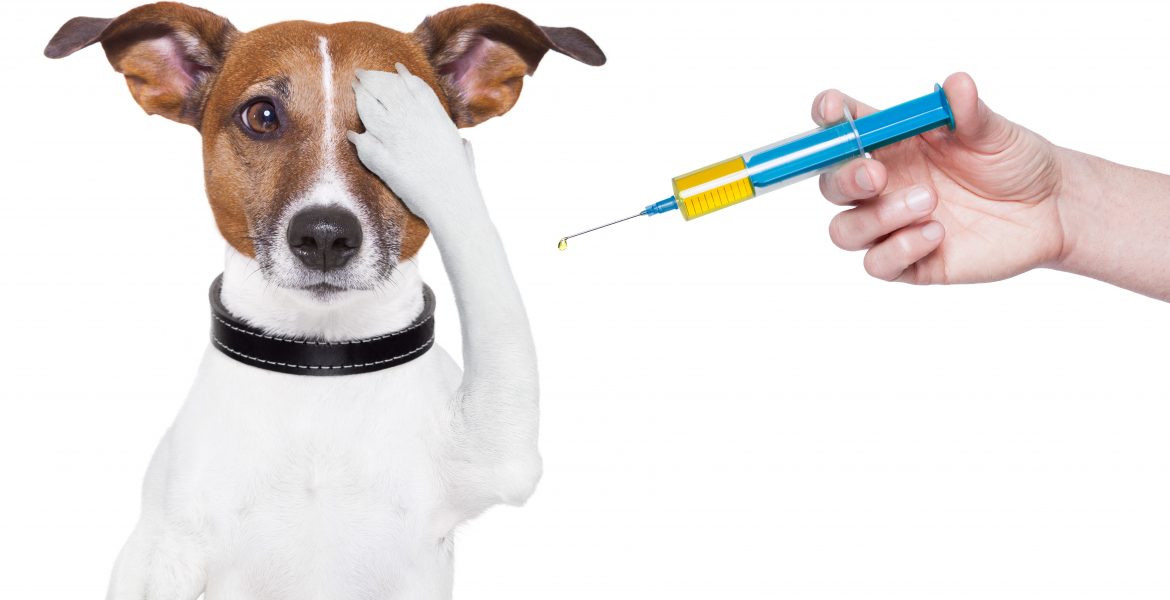Every dog owner wants to make sure their dog lives a long and healthy life and one of the best ways to make sure of this is to follow the recommendations of a vet. There are many vaccines currently in use in the UK, but which ones does your pup really need? Below are very brief descriptions of the diseases that some
vaccines protect from. In the UK, each condition that we commonly vaccinate dogs against requires a different vaccination agent, although these are usually combined and administered together in one or two treatments, to avoid the need for multiple vet visits and injections.
Parvovirus
What is it and how is it caught?
By contact with faeces from infected dogs. The virus can survive in the environment for up to 9 months. Parvovirus mainly affects puppies between 6 weeks and 6 months old and the symptoms include heart problems, which can result in death.
Distemper
What is it and how is it caught?
Most commonly spread by direct contact with an affected animal and is spread by bodily discharge (e.g. saliva). Symptoms can include a number of things such as fever, depression, coughing, vomiting and diarrhoea. Dogs with very severe symptoms often die, and mildly affected dogs will usually recover, however some will have neurological problems later in life.
Leptospirosis
What is it and how is it caught?
Lepto is a disease caused by a bacterium, mainly spread by contaminated water, so dogs are at risk if they swim or drink from canals or areas with a high number of rats. It can cause a fever, lethargy, increased thirst, vomiting and diarrhoea.
Hepatitis
What is it and how is it caught?
Spread by contact with saliva, urine, blood or faeces of infected dogs. There are two versions of this virus. One causes kennel cough, the other causes hepatitis. It can cause coughing, fever, vomiting, diarrhea, and jaundice .
The science bit
Vaccines contain a small dose of either dead or live organisms. These trigger the pet’s immune system to produce antibodies against disease. Antibodies are proteins produced by the body to neutralise or destroy disease causing organisms and toxins. Vaccination primes your pet’s immune system on how to produce the correct antibodies quickly. If your pet then comes into contact with one of the diseases, its immune system will recognise it and immediately produce the antibodies needed to fight the disease
When to vaccinate your dog
When a puppy is born, he is usually protected from infections due to the intake from his mother’s milk (providing she has been vaccinated). However, this protection can only last a few weeks so vaccinations are needed soon after. Puppies are usually vaccinated at 8 and 10 weeks old. Your puppy should then be given a booster 12 months after their first vaccination. However vaccinations can be given at any time and if you have a dog that has never been vaccinated, it’s never too late to start. Once they have been vaccinated, most dogs will hold protective immunity longer than a year (but there are variables).
A word of warning
If you’re a dog owner, you should speak to your vet and weigh up the pros and cons of annual vaccination boosters for your dog.
After an initial course of vaccinations, your dog will be offered booster jabs at regular intervals. There has been much debate as to whether regular booster vaccinations are necessary. Vaccines have a low rate of reactions but, as with any medication, there can be side effects. The vet and owner must take into account the risks of the vaccine versus the likelihood of contracting a potentially life-threatening disease.
One suggestion is to vaccinate pups and also give the first annual booster and after that consider titre testing your dog’s blood for antibody levels. Here blood samples are taken and immunity levels are measured, helping owners and vets decide whether a vaccination for some diseases is necessary. Your vet can test for parvo, hepatitis and distemper antibodies. If antibody level remains high then discuss whether the annual boosters for those diseases can be avoided that year. Take into account the risks of these diseases in your area, the specific risk or lack of to your own dog and the effectiveness of the vaccine to decide what is necessary for your dog.
Another alternative to vaccinations are nosodes. Nosodes are homeopathic medicines made from elements of the disease and given as a tablet in a course. However it’s important to note that these were originally designed to treat the disease, not protect against it. The general consensus for this treatment is that nosodes are not to be relied on to give protection against diseases but can be used if your dog has had his first set of jabs as a puppy and his one-year booster. But remember always speak with your vet first!


